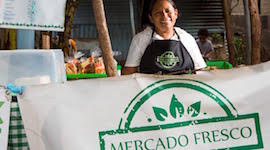This case study shares five valuable lessons for impact investors and enterprises to strengthen their impact measurement practices. The case is based on experiences testing an impact measurement framework with social enterprises in Nicaragua, Brazil and Peru. The case provides recommendations to improve the impact measurement practices of investors, as well as the enterprises they support. For investors, creating a standardized set of indicators to be shared across enterprises is beneficial for aggregating data, using resources efficiently, and facilitating shared learnings across their network of investees. For investees, impact measurement can expose vulnerabilities along the value chain that affect an enterprise, such as turnover and client loyalty.
Since 2015, WDI has partnered with the Inter-American Development Bank (IDB) to lead the SCALA Metrics Lab. SCALA is the largest network of micro-distributors in Latin America and the Caribbean. The Metrics Lab assists SCALA member organizations to improve their capacity for impact measurement.
As part of this work, WDI developed and tested a new framework for boosting the impact of small inclusive businesses and their distribution networks with three member organizations in Brazil, Nicaragua, and Peru between January 2016 and May 2017. These pilot projects resulted in strong, context-specific surveys for each organization and monitoring and evaluation training to the staff. The project helped ensure that each organization established appropriate processes for collecting survey data and internalizing impact measurement within their respective programs.
Want to learn more about this project? Check out this example survey or read WDI’s Impact Report: Positive Change Through Actionable Metrics. WDI also teamed up with MIT D-Lab to write a Lean Research case study about the work.
WDI finalized three project reports, one for each organization, that can be used by the social enterprises as they proceed with their impact measurement work:
WDI’s Performance Measurement Initiative is partnering with the Inter-American Development Bank (IDB) to pilot test a new framework for boosting the impact of small inclusive businesses and their distribution networks in Brazil, Nicaragua, and Peru.

Heather Esper, senior program manager of WDI’s Performance Measurement Initiative (PMI), developed the framework for IDB’s SCALA network, a platform to scale the impacts of inclusive and social business in Latin America and the Caribbean. Through SCALA, anchor companies, microfinance institutions, academia, and non-governmental organizations combine efforts to grow micro‐distribution networks based on micro-franchising models. Those models in turn provide business opportunities and access to products and services to those living at the base of the economic pyramid.
Esper first presented the SCALA metrics framework at a conference last year in Mexico which includes a mix of standardized social and business metrics over the short and long term. These indicators can be tailored to each organization in the network. Over time, the framework reveals the impact each venture is having on the micro-distributors, the people SCALA aims to help.
Following the Mexico conference, there was great interest in having WDI’s PMI team pilot the framework with different micro-distribution organizations in SCALA’s network. The goal of piloting is to test and refine the framework, as well as gauge how well these ventures improve the lives of their micro-distributors. The pilot also will inform best practices for other organizations within SCALA to adapt and implement the framework to assess their impacts in Brazil, Nicaragua, and Peru.
“SCALA would like everyone in the network to use this standardized framework,” Esper said. “We’re working closely with three organizations to pilot the framework in order to assess how easy or difficult it is for them to use. We also want to examine how it creates value for the organizations – such as informing decision-making – in order to refine the framework and develop training materials for the roll out of the framework to the rest of the network.”
The three organizations that are part of the pilot are:
Starting in May, Esper and her PMI colleagues Yaquta Kanchwala Fatehi, PMI senior research associate, and Becca Baylor, PMI research associate, adapted the framework presented in Mexico City to each organization by identifying context-specific indicators for each venture that would properly reflect the impact on the micro-distributors, and developed a data collection process plan.
The team is currently developing surveys for the three organizations, which will include a pre-test, and once complete will focus then on collecting the data, analyzing it, and writing a final report that shares the lessons learned during the pilot in addition to reporting on the findings and methodology. Esper and Baylor will travel to Peru in September to pretest the survey with Chakipi.
“We aim to compare these standardized indicators across the three organizations for the final assessment,” Esper said.
Before the pilot is completed in February 2017, Esper and Baylor will share the progress to date at the SCALA annual meeting in Cali, Colombia in October.
There are many benefits if all organizations within SCALA used the same assessment framework, Esper said.
“If all organizations within SCALA are collecting the same metrics, then learning across organizations can be improved,” she said. “There would be more systematic learning between organizations if they report these standardized indicators annually to SCALA. For instance, this work can lay the foundation for SCALA to better predict client loyalty, distributor growth capacity, as well as address vulnerabilities across the value chain. SCALA can also aggregate the findings and make a business case about the impacts of the micro-distribution model and the value of the network to the broader community.”